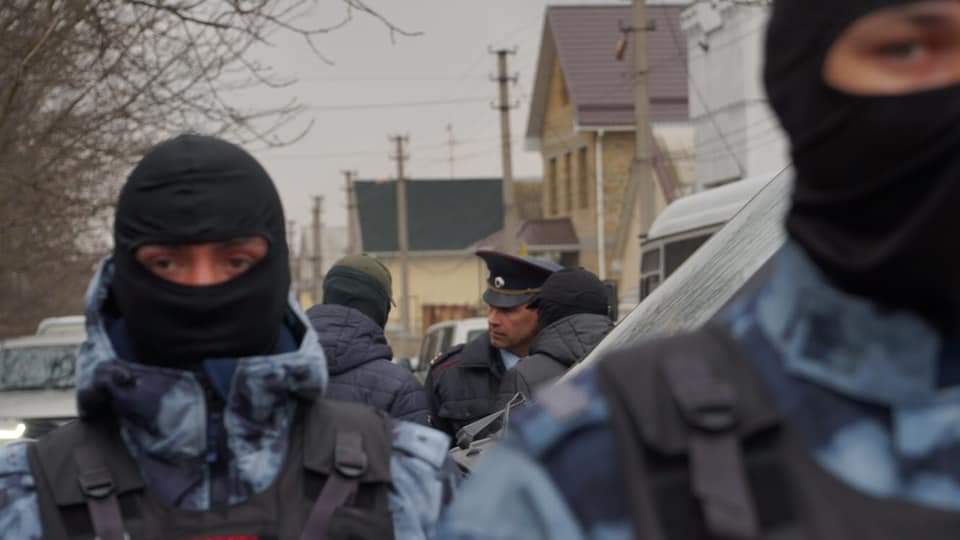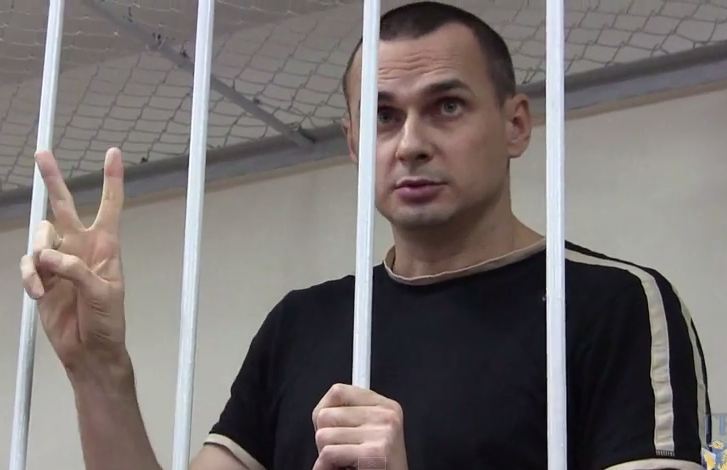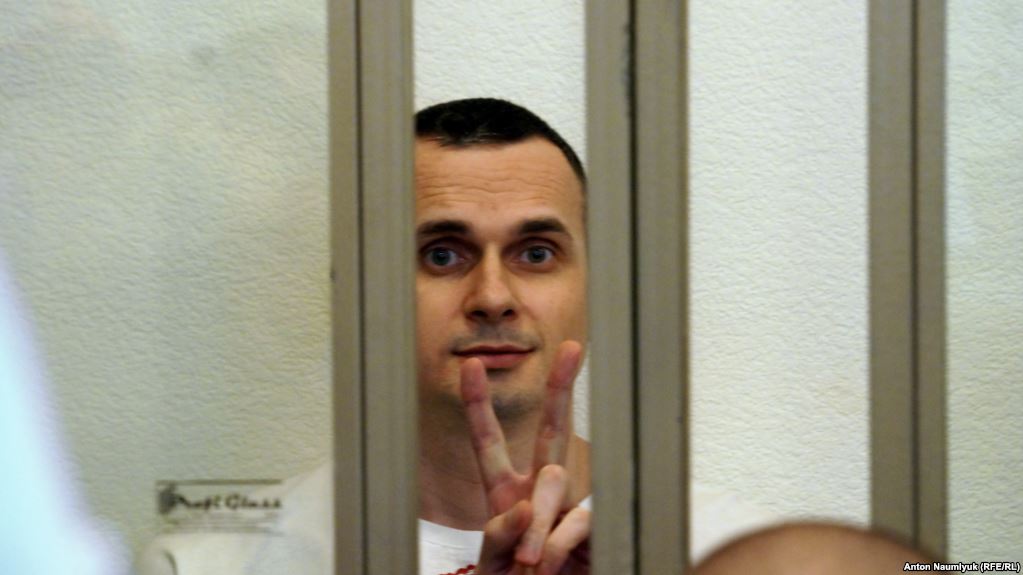The peninsula had disappeared from the first pages of international media outlets long ago. Ukrainian journalists rarely travel for stories from Crimea. The only ones who stir up the information wave come from inside the occupied peninsula - a group of civic journalists who put themselves on the line to prevent their homeland from becoming an isolated island of lawlessness.
Just after Crimea was annexed by Russia, the peninsula became more and more isolated and information became nearly inaccessible.
The Crimean Tatar TV channel ATR worked under the blows of security officials for several days and then its newsroom was forced to move to Kyiv at the end of spring 2014.
The stifling of media pluralism, the closure of Ukrainian and Crimean Tatar media, and criminal cases launched against Ukrainian journalists make information from Crimea completely inaccessible. The only journalists who can work freely in Crimea are Russian. But, with rare exceptions, their information follows the narrative "happy return of Crimea to the homeland.
However, for many in Crimea, life is not so happy. Every Thursday, law enforcement raids the homes of Crimean Tatars, the indigenous population of Crimea which overwhelmingly opposed Russian occupation. Over fifty people have been arrested because of disagreeing with the regime. Thanks to some voices, especially those broadcast through social networks, it’s possible to seek out a more complex picture of the situation in the peninsula and at least partially break the silence. We collected the voices of our colleagues - civil journalists in Crimea.
On 27 March at 6 AM, hundreds of armed police operatives parked their cars near some 50 houses in a Crimean Tatar village. Masked men with dogs barged inside kitchens and bedrooms, searching for banned literature in houses of the ethnic Muslims. As a result, during the first day, 20 people were arrested, and the next day, three more Crimean Tatars were arrested and beaten during an FSB operation in the Russian city of Rostov-on-Don. The whereabouts of one man who disappeared that day are still unknown.

Russian local authorities have declared that they are involved in Hizb ut-Tahrir, an Islamic organization criminalized by Russia as a terrorist group but absolutely legal in most countries of the world, including Ukraine. Since its conception, it has not been involved in a terrorist act anywhere in the world. In Crimea, not a single terrorist act has happened since the annexation. Neither had a single terrorist act happened in the Ukrainian peninsula before it was occupied by Russia.
When human rights activists began to analyze the biographies of the men arrested on March 27, it turned out that most of them were members of Crimean Solidarity. This is a group of people who help political prisoners and their families. Their main task is to spread information. They broadcast videos on facebook from the courts on cases of political prisoners, livestream solitary protests, send information to Ukrainian journalists from inside the peninsula, come to the homes of Crimean Tatars raided by the Russian law enforcement forces and show everything live.

Crimean Solidarity stated that the arrests on 27 and 28 March are another offensive on freedom of speech in Crimea and a purge of journalists in Crimea.
“They arrested streamers and bloggers Osman Aryfmemetov and Rustem Sheykheliev, who are well-known in Crimea. As well, they arrested Remzi Bekirov, a citizen journalist for ‘Crimean solidarity’ who had covered all the political trials over 4 years. At the beginning of March 2019, he started to work with Grani.ru and received a press card which allowed him to cover the trials as a professional journalist,” they added.
Euromaidan Press has already wrote about Remzi Bekirov. Having initially studied history, after the annexation of Crimea he started covering all the politically motivated trials in the peninsula. Taras Ibrahimov, a Ukrainian journalist writing about Crimea, told that Remzi had dreamt of being a journalist and asked him about the rules of the profession. profession. The father of three children faces life imprisonment. "In today's Crimea, civic journalism is not only a relevant phenomenon, it's a crucially needed one," Remzi told.
Remzi’s words are echoed by Sofinar Muniyeva, a woman who chose to remain anonymous.
“Nobody covers the repressions besides me and a few other people. Ordinary Ukrainians do not understand what is going on in Crimea and many people thought that everyone here is a traitor. But this is unfair.”
Crimean Tatar journalist Ramazan (the name is changed due to security concerns) said it's not a way to earn, but a kind of battle against evil.
Sofinar is a journalist by training, but other citizen journalists are not. Several times, Sofinar created a training course for them so they could be more professional in their reporting. Sofinar explains that information coming from inside the peninsula is so scarce that anybody can make an information bomb for external audiences. Citizen journalists have started covering the increasing repressions, searches, and arrests going on in the peninsula.
But how does it work? To become a journalist in Crimea, it’s not enough to simply send an email with CV and find a connection with the editor. Crimea citizen journalists have a five-year-long school of trust and communication based on solidarity. And, of course, nobody came to this profession because of money.
“My Islamic religion does not permit me to lie, so I think my colleagues can trust me and the information which I give. I started trusting to trust them more when we really became a family,” Ramazan explained.
In the situation of pressure, journalism standards become not theory, but a security prerequisite.
“The most important knowledge which we need to know is our rights. Nobody can forbid me from filming in the street, but I need to be sure that I do not do anything criminal when I am in front of police,” Ramazan teaches us the secrets of the profession.
Anna (the name is changed) made journalistic trainings with a special focus on security.
“All the communication with police should be filmed. Every journalist should have several channels of communication and know who to call when a problem arises. Also it’s very important is to know journalistic rules of covering sensationalist topics, such as children or people in a mood for suicide.”
The story of Nariman Memedeminov, a member of Crimean Solidarity and a citizen reporter, is a clear example of this worrying trend. Memedeminov, who was already a target for local police due to his participation in demonstrations, was taken from his house in the morning of March 22 and is imprisoned in a pre-trial detention center in Simferopol.
In February two Ukrainian journalists, Alina Smutko and Aliona Savchuk, who covered Crimea since 2015, were banned entry to the peninsula by Russian border guards with no rights to come for 10 years.
“The fear of being arrested is always present,” told Sofinar Muniyeva. “Every morning I get up and thank God for having started the morning with an alarm clock, not a FSB visit. Because so many families at Crimea have a totally different situation.”
“My family spends every day as the last one together. And it is not a metaphor - the next morning they [FSB officers - ed] can take me away. But I don't care anymore. I think the profession of a cameraman doesn’t allow you to give emotions a chance. The more pressure, the more adrenalin there is to do something more,” Ramazan said.
What should be expected from the future? Crimea has nearly disappeared from newspapers and international political agendas. Even in Ukraine in the election discussion, Crimea is not at the top of the agenda.
“Unfortunately, we receive attention from foreign journalists only the anniversary of the occupation [in March - Ed], and every year there is less of it,” Munieva mentions. “It is very sad when there are a lot of terrible things going on here, but everybody has started to simply forget about this territory and the people who are left here.”
"It would be cool if the international media grabbed the information we get here at the risk of our lives," Ramazan said. “Our only power lies in our cameras, but journalists have press cards, big TV-stations. They have the right to enter every court, every door of the authorities. The authorities don’t allow us to create even a small newsroom, not even speaking about a TV-station.”





